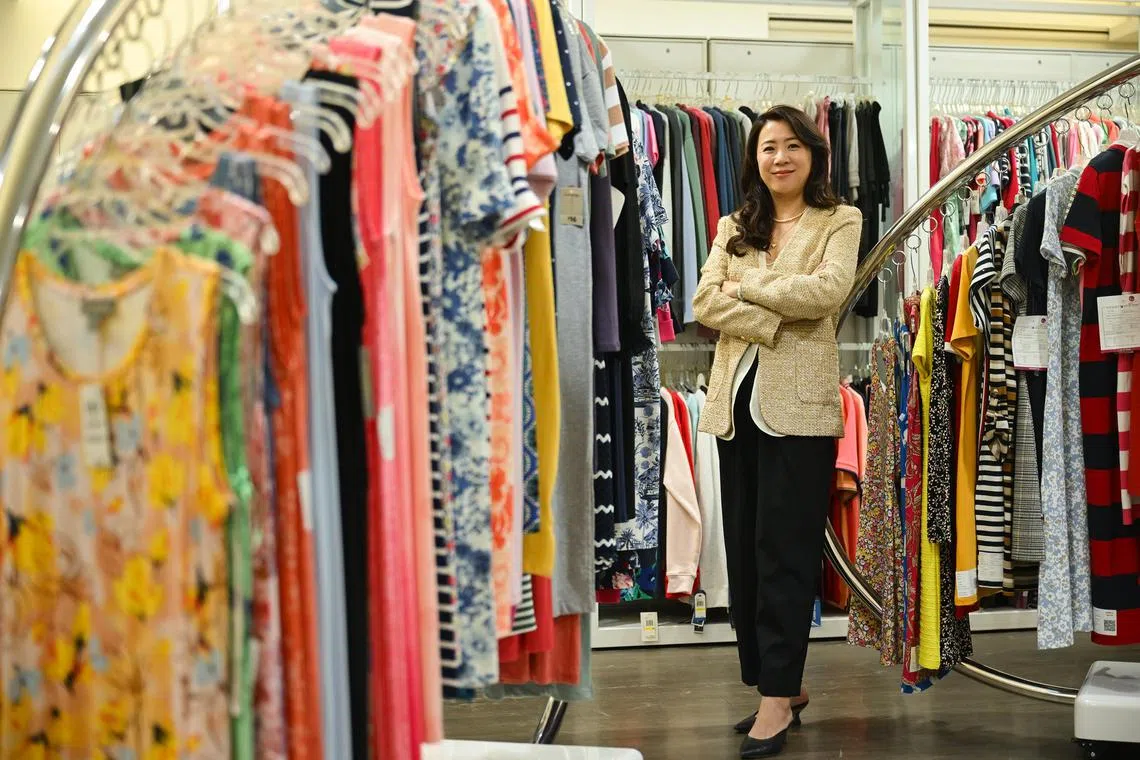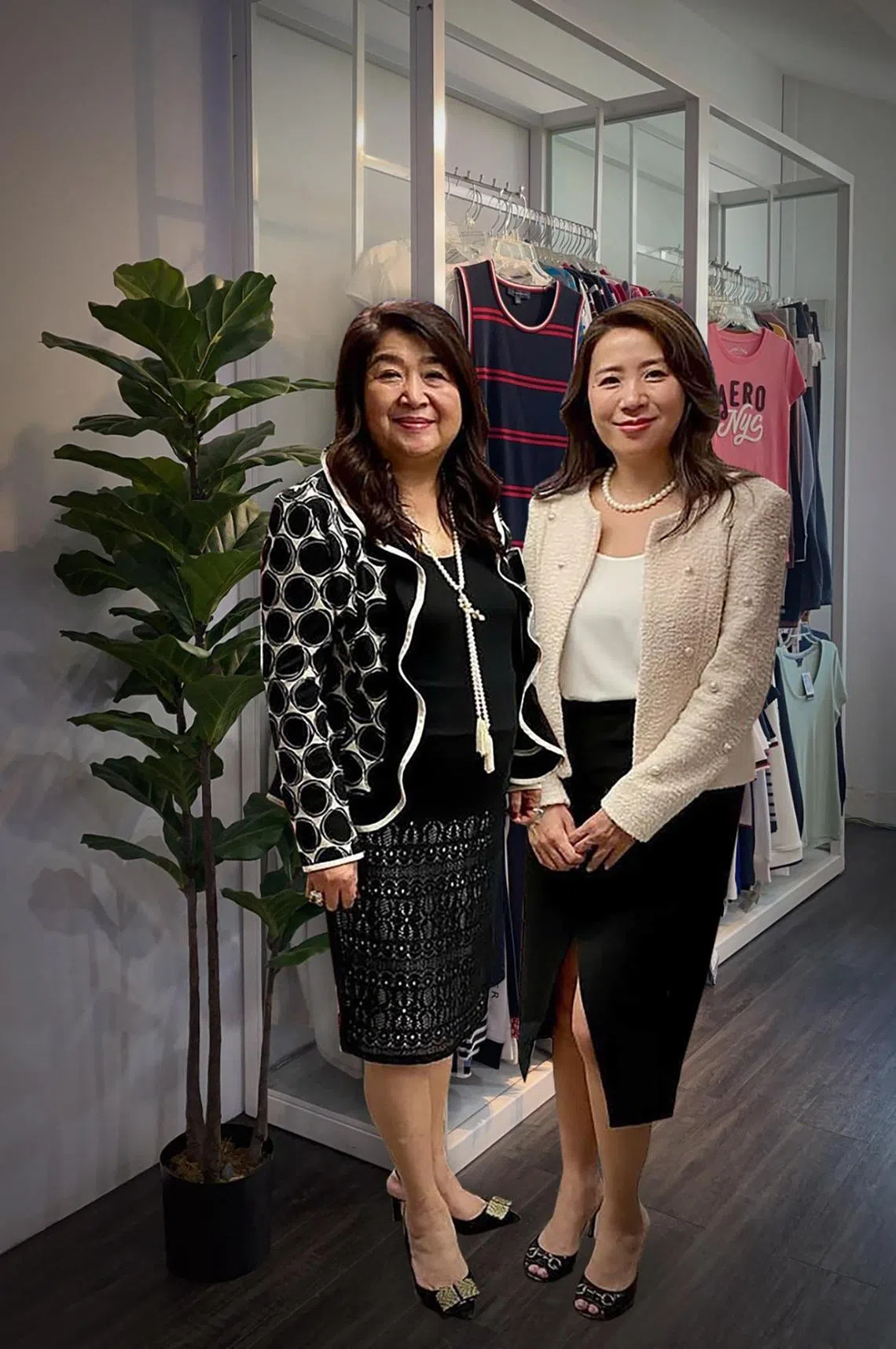Trust Your Spark
From threads to triumphs: How Felicia Gan is weaving change in the global garment empire her mother built
In a six-part series, The Sunday Times profiles people who have made an impact in various fields by trusting their instincts and having faith in their skills. In this fifth instalment, features editor Wong Kim Hoh speaks to Ms Felicia Gan, who is not only advancing the garment business her mum founded but also setting new standards for the industry.
Sign up now: Get ST's newsletters delivered to your inbox

Chief Executive Officer of Ghim Li Felicia Gan, in her office on July 11.
ST PHOTO: AZMI ATHNI
Follow topic:
It’s a Singapore success story, and a marvellously inspiring one at that.
In 1977, a plucky 25-year-old Estina Ang started a garment sub-contractor business with six sewing machines and $3,000.
She grew that small business into a global garment empire that hires about 9,000 workers in half a dozen countries.
Today, Ghim Li Group supplies more than 65 million pieces of apparel annually to an impressive list of clients, including US retail giants such as Macy’s and Walmart. It is a one-stop provider of manufacturing, sourcing, design, market intelligence and logistic services.
The tale, however, does not end there. Madam Ang’s daughter Felicia Gan – a lawyer by training – joined the company 18 years ago and has taken over the reins as chief executive.
“My mother built a very good house,” she says. “My job is to make the house look even better.”
And made it better she has, with a sharp focus on sustainability that promises to redefine the industry.
The second of five children, Ms Gan readily admits she has big shoes to fill.
“My mother studied history at Nanyang University and when she graduated in the 1970s, she was offered a government job which, in those days, was like an iron rice bowl.
“But she decided to become a secretary in a garment company where she did eight jobs including sales, marketing, planning, human resources, production, sewing and logistics. That’s why she expects us to wear eight hats too,” she quips.
After a couple of years, Madam Ang struck out on her own and was so successful that she bought over her boss’ factory in less than a decade.
Ms Gan recalls: “She went to Malaysia, Bangkok and Brunei. In the 1980s, when no one thought of doing business in Fiji, she went to the World Bank to borrow money to open five factories there. Mind you, she was not very fluent in English since she was Chinese-educated.”
Her mother grew the business while raising five children and even set up an office in Los Angeles where she secured some of her biggest clients.
“When we were children, she would take us to Walmart and other department stores in the US to do ‘market research’. She would point to garments, tell us where they were made and how much they cost. In many ways, we lived and breathed the business even when we were kids.”
Ms Gan was initially uncertain about joining Ghim Li. After earning her law degree from the University of Nottingham in 2003 and being called to the Singapore Bar in 2005, she started her career at Rajah & Tann, specialising in mergers and acquisitions.
However, family ties proved stronger. When her mother and eldest sister sought her help shortly after Ghim Li went public in late 2005, she gave up her dreams of becoming a hotshot corporate lawyer.

Ms Felicia Gan (right) with her mother Estina Ang.
PHOTO: GHIM LI
She started as a legal officer in the company, writing human resources manuals and setting up legal and governance frameworks. Over the years, her roles changed; she was head of business development and chief marketing officer before becoming deputy CEO in 2019, and chief executive two years later. Her 72-year-old mother remains as executive chairman of the company.
It helps that she has the quality that her mother prizes: the desire to learn.
“She always told her staff, ‘If you are willing to learn, I will teach you everything I know’,” says Ms Gan, who is single.
She learnt not only from her mother but also from her trusted “generals”, several of whom have climbed the corporate ladder and remained with the company for many years.
In many ways, Ms Gan’s mission is clear: to build upon and enhance the legacy her mother has established.
From 2016, she steered Ghim Li on a significant journey towards sustainability.
“Why? Because that is the ballgame today. Being a forerunner helps, because you have visibility. Customers will know and trust that you are reliable.”
The company started with small steps like switching to LED lights and installing transparent roofing to harness natural light in all its factories.
The journey gained momentum in 2017, driven by Walmart’s Project Gigaton which aims to reduce or avoid one billion tonnes (one gigatonne) of greenhouse gases from the global value chain by 2030.
“Walmart is one of our key strategic customers and we were one of the pilot vendors. We actually volunteered ourselves because at that point, sustainability is not a must-have but a good-to-have. But I told myself that when something is new, you should go in there to learn because you will learn more.”
Addressing the fashion industry’s notorious water consumption, Ghim Li introduced systems to reuse steam from boilers, saving 1.1 million tonnes of water or half their consumption annually. It also set up a reverse osmosis plant to recycle 30 per cent of wastewater, and eliminated harmful chemicals from its processes.
Sustainability becomes addictive once you see the initial successes, Ms Gan says. Busting the myth that it is always costly, she suggests starting with “low-hanging fruits” – changes that require less investment but can yield significant environmental and financial benefits.
“If we use cheaper but more hazardous chemicals, they will flow into our water treatment plant and we have to put more ancillary chemicals to treat the water before we dispose of it,” she says.
With a reverse osmosis water treatment facility, “we also change filters less often”. “So there are a lot of secondary savings that you would not have thought of.”
Ghim Li – which has its own fabric mill in Malaysia – is always on the hunt for sustainable fabric innovations.
In 2020, the company secured a new sustainable plant-based antimicrobial technology developed by Nanyang Technological University scientists that can be used as an antibacterial fabric finishing.
This innovation thrust Ghim Li into the limelight during the Covid-19 pandemic, when it was approached by the Government to make 20 million pieces of reusable anti-bacterial masks.
Despite the tight one-month deadline, the company rose to the occasion and fulfilled the order. The effort earned Ms Gan the Public Service Medal in 2021.
Right now, she is extremely excited about textiles treated with CozTerra, a surface coating developed by local start-up Xinterra that can absorb carbon dioxide. Apparently, 20 T-shirts made from coated material can absorb the same amount of carbon dioxide a mature tree removes in a day.
“When you wash the T-shirts, the laundry detergent and the water will react and change the carbon (dioxide) to baking soda (sodium bicarbonate) so that it doesn’t go back into the environment,” says Ms Gan, who has shared Ghim Li’s sustainability journey at numerous events.
One such event was the inaugural Navigating Change Together: Partnering For A Sustainable Future, organised by DBS in April. It focused on helping businesses incorporate environmental, social and governance practices in their operations.
Ms Gan says DBS has seen Ghim Li through thick and thin, including the Asian financial crisis in 1997 and the outbreak of the severe acute respiratory syndrome, or Sars, in 2003.
“Because of our longstanding relationship, DBS did not cancel any of our credit lines during Covid-19,” says Ms Gan, who became CEO in July 2021 when the pandemic was raging.
“The lines were very needed at that point in time, because it was business as usual, and we had a big mask contract with the Government. The asset conversion cycle and also the yarn purchase was a lot bigger, but the bank continued to support us in trade financing.”
With Ms Gan at the helm, Ghim Li has launched other initiatives including 3D design to reduce the amount of samples and lead time in prototyping, as well as digitalisation of the ordering process.
“We have to continue exploring untapped areas such as automation and digitalisation within our group,” says Ms Gan, adding that Ghim Li is currently building a green factory on 4ha of land in Central Java, Indonesia.
She names her employees, customers and industry partners as the sparks which ignite her.
“And, of course, my primary motivator and mentor is my mother, who has always inspired me to spark change in the business and scale greater heights.”



